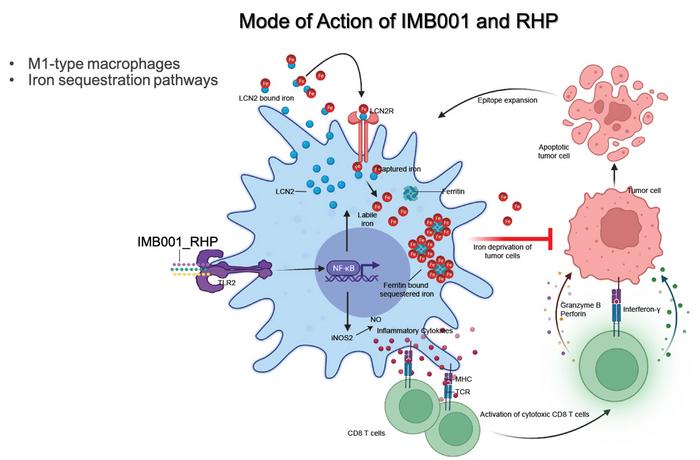A team of POSTECH and ImmunoBiome has made a significant breakthrough in the fight against cancer. Their research, published in the May issue of Nature Immunology (Volume 25, pages790–801,2024), explores a dietary-derived bacterial strain, IMB001. This strain induces “nutritional immunity” to boost anti-tumor responses. This discovery sheds light on how microbial therapies work and opens doors for their use in clinical settings.

Credit: POSTECH
A team of POSTECH and ImmunoBiome has made a significant breakthrough in the fight against cancer. Their research, published in the May issue of Nature Immunology (Volume 25, pages790–801,2024), explores a dietary-derived bacterial strain, IMB001. This strain induces “nutritional immunity” to boost anti-tumor responses. This discovery sheds light on how microbial therapies work and opens doors for their use in clinical settings.
The groundbreaking research, led by Dr. Sin-Hyeog Im, a professor at Pohang University of Science and Technology (POSTECH) and founder & CEO of ImmunoBiome, established a novel strategy for identifying beneficial bacteria suitable for cancer treatment. They further unraveled the mechanism by which these bacteria induce specific immune responses in the body. They are currently filing Investigational New Drug (IND) applications and planning to initiate a clinical trial in 2025. IMB001 can be used as a combination therapy alongside existing checkpoint inhibitors.
IMB001 is a unique single-strain Live Biotherapeutic Product (LBP), classified as Lactobacillus plantarum IMB19 (LpIMB19). It has shown impressive results in preclinical studies for various cancers. In animal models, IMB001 has been shown to delay tumor progression in melanoma, renal cancer, breast cancer, and experimental metastasis. Additionally, it potentiates the effectiveness of checkpoint inhibitor therapy (anti-PDL1). The research team has also isolated the effector molecule, Rhamnose-rich Capsular Polysaccharide (RHP), from the bacteria IMB001. This molecule shows promising effects in animal models of cancer. These advancements pave the way for a new generation of highly effective and potentially more accessible microbial cancer therapies.
Hence, it also offers a viable option as a combination therapy with conventional cancer treatments. IMB001’s mode of action involves skewing tumor-infiltrating macrophages toward an inflammatory phenotype. These activated macrophages further activate the adaptive immune system, increasing infiltration and activation of IFNγ+CD8+ T cells. On the other hand, these inflammatory macrophages deploy a high-affinity iron transporter called Lipocalin 2 (LCN2) to essentially starve tumor cells by grabbing and sequestering iron from their surroundings. Deprivation of nutritionally essential trace element iron leads to increased cell death of rapidly multiplying tumor cells, potentially leading to epitope expansion (increased immune system targets) and overall tumor growth suppression.
Prof. Im emphasized the significance of this research, stating it represents a significant leap forward for the company and strengthens their position as a leader in LBPs. He expressed excitement about moving IMB001, discovered through Avatiome, towards clinical development. He further highlighted the importance of understanding how LBPs interact with the immune system to generate potent anti-tumor responses. This paves the way for a multi-faceted approach to cancer treatment. He emphasized how current microbial therapies were often chosen based on their effects, not the underlying mechanisms. ImmunoBiome has successfully identified and validated IMB001’s mechanism for boosting anti-tumor immunity within tumors.
ImmunoBiome is a frontrunner in developing Live Biotherapeutic Products (LBPs) to tackle currently incurable conditions like cancer and autoimmune diseases. Their expertise lies in discovering, identifying, and developing therapies based on live bacteria and derived drugs. Through their proprietary platform, Avatiome, the company rationally selects pharmacologically active bacterial strains and understand mechanism of action in different disease settings. They collaborate with leading global researchers to identify, isolate, purify, and chemically characterize immunologically active molecules from bacteria. ImmunoBiome has built its own database of human commensal bacterial strains isolated from various mucosal surfaces. Additionally, they are at the forefront of developing predictive strategies that link biomarkers to disease prognosis using vast datasets from human clinical trials.
Journal
Nature Immunology
Article Title
A dietary commensal microbe enhances antitumor immunity by activating tumor macrophages to sequester iron
Article Publication Date
25-Apr-2024



